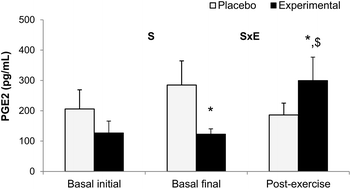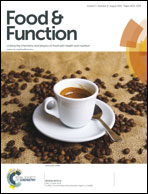Effect of DHA on plasma fatty acid availability and oxidative stress during training season and football exercise
Abstract
The aim was to determine the effects of a diet supplemented with 1.14 g per day of docosahexaenoic acid (DHA) for eight weeks on the plasma oxidative balance and anti-inflammatory markers after training and acute exercise. Fifteen volunteer male football players were randomly assigned to placebo or experimental and supplemented groups. Blood samples were taken under resting conditions at the beginning and after eight weeks of training under resting and post-exercise conditions. The experimental beverage increased the plasma DHA availability in non-esterified fatty acids (NEFAs) and triglyceride fatty acids (TGFAs) and increased the polyunsaturated fatty acid (PUFA) fraction of NEFAs but had no effects on the biomarkers for oxidative balance in plasma. During training, plasma protein markers of oxidative damage, the haemolysis degree and the antioxidant enzyme activities increased, but did not affect lipid oxidative damage. Training season and DHA influenced the circulating levels of prostaglandin E2 (PGE2). Acute exercise did not alter the basal levels of plasma markers for oxidative and nitrosative damage of proteins and lipids, and the antioxidant enzyme activities, although DHA-diet supplementation significantly increased the PGE2 in plasma after acute exercise. In conclusion, the training season and acute exercise, but not the DHA diet supplementation, altered the pattern of plasma oxidative damage, as the antioxidant system proved sufficient to prevent the oxidative damage induced by the acute exercise in well-trained footballers. The DHA-diet supplementation increased the prostaglandin PGE2 plasma evidencing anti-inflammatory effects of DHA to control inflammation after acute exercise.


 Please wait while we load your content...
Please wait while we load your content...